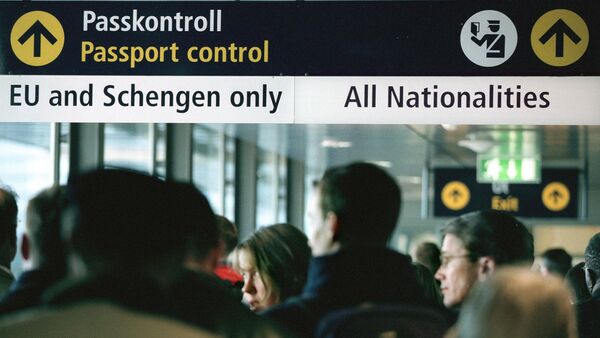The EU Commission has accepted that for several countries across Europe, border checks must be allowed to go ahead. That is a direct contradiction of one of the pillars of the EU project — that there should be the freedom of movement for people throughout the European Union.
However, for Austria, Germany, Denmark, Sweden and non-EU nation Norway — all members of the Schengen zone where there are usually no passport checks — this principle will be suspended for three months.
The @EU_Commission proposes to prolong internal border controls for a limited period of 3 months — @Avramopoulos https://t.co/fFWIZ68ijq pic.twitter.com/5JKKs0TGMr
— European Commission (@EU_Commission) October 25, 2016
The Commission pointed to the ongoing migrant crisis as being the reason for the move, adding that there are "a significant number" of migrants continuing to arrive in Greece, and that border controls are needed to prevent them continuing to move unchecked throughout the EU.
Many migrants and refugees, some fleeing conflicts in Iraq and Syria, do not apply for asylum in the original country of arrival, which is a breach of the Dublin convention under the Schengen Agreement.
Dimitris Avramopoulos, the EU Commissioner for Migration, Home Affairs and Citizenship tried to deflect accusations that the move is an acknowledgement that the EU is struggling to manage the crisis.
"Let me be clear that what we are proposing today is the exception in exceptional circumstances," Mr. Avramopoulos insisted at a press conference on Tuesday, October 25.
"It is not the new norm."
We are determined to work with MS in bringing back #Schengen: no internal border controls & strong external borders https://t.co/Lf4HHfQZub pic.twitter.com/g4dq51ijhK
— DimitrisAvramopoulos (@Avramopoulos) 25 October 2016
The ban has already been in place for several months, but the extension has come amid growing pressure from several EU members. It was recommended by the governments of Germany, Austria and Denmark. Germany, in particular, has been overwhelmed by nearly one million migrants, who see the western European nation as particularly desirable to aim to settle in. Norway, meanwhile, has repeatedly raised security concerns over undocumented migrants.
There are now 26 members of the Schengen zone: 22 EU members, and four non-EU members (Iceland, Norway, Switzerland and Liechtenstein).
EU home affairs commissioner Dimitris Avramopoulos, said this extension was likely to be the last.
European Border and Coast Guard Agency training in Turku: Sea surveillance simulation exercise @AboaMareFin @rajavartijat pic.twitter.com/BmYVC81b5l
— Frontex (@Frontex) October 13, 2016
The expanded European Border and Coast Guard force is set to be fully operational by January. An EU-Turkey deal in March, has also sharply reduced the number of people from Syria and other countries from crossing the Aegean Sea to Greece: the main entry point to Europe last year.
"We believe that these three months will be the end of this period (of controls) and we shall be back normally to the full functioning of Schengen," Mr. Avramopoulos said.
"The strictly limited extension that we propose is aimed at adjusting the current temporary internal controls to reflect the current needs."




